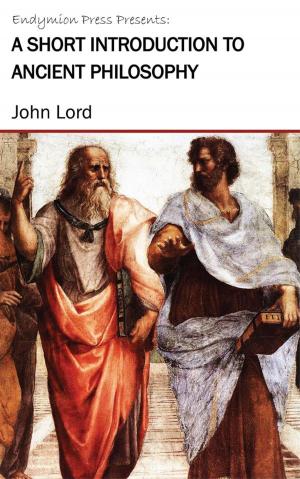| Author: | John Lord | ISBN: | 9781537825311 |
| Publisher: | Endymion Press | Publication: | April 22, 2017 |
| Imprint: | Language: | English |
| Author: | John Lord |
| ISBN: | 9781537825311 |
| Publisher: | Endymion Press |
| Publication: | April 22, 2017 |
| Imprint: | |
| Language: | English |
This lecture is intended to set forth a memorable movement in the Roman Catholic Church,--a reformation of morals, preceding the greater movement of Luther to produce a reformation of both morals and doctrines. As the representative of this movement I take Savonarola, concerning whom much has of late been written; more, I think, because he was a Florentine in a remarkable age,--the age of artists and of reviving literature,--than because he was a martyr, battling with evils which no one man was capable of removing. His life was more a protest than a victory. He was an unsuccessful reformer, and yet he prepared the way for that religious revival which afterward took place in the Catholic Church itself. His spirit was not revolutionary, like that of the Saxon monk, and yet it was progressive. His soul was in active sympathy with every emancipating idea of his age. He was the incarnation of a fervid, living, active piety amid forms and formulas, a fearless exposer of all shams, an uncompromising enemy to the blended atheism and idolatry of his ungodly age. He was the contemporary of political, worldly, warlike, unscrupulous popes, disgraced by nepotism and personal vices,--men who aimed to extend not a spiritual but temporal dominion, and who scandalized the highest position in the Christian world, as attested by all reliable historians, whether Catholic or Protestant. However infallible the Catholic Church claims to be, it has never been denied that some of her highest dignitaries have been subject to grave reproaches, both in their character and their influence. Such men were Sixtus IV., Julius II., and Alexander VI.,--able, probably, for it is very seldom that the popes have not been distinguished for something, but men, nevertheless, who were a disgrace to the superb position they had succeeded in reaching...
This lecture is intended to set forth a memorable movement in the Roman Catholic Church,--a reformation of morals, preceding the greater movement of Luther to produce a reformation of both morals and doctrines. As the representative of this movement I take Savonarola, concerning whom much has of late been written; more, I think, because he was a Florentine in a remarkable age,--the age of artists and of reviving literature,--than because he was a martyr, battling with evils which no one man was capable of removing. His life was more a protest than a victory. He was an unsuccessful reformer, and yet he prepared the way for that religious revival which afterward took place in the Catholic Church itself. His spirit was not revolutionary, like that of the Saxon monk, and yet it was progressive. His soul was in active sympathy with every emancipating idea of his age. He was the incarnation of a fervid, living, active piety amid forms and formulas, a fearless exposer of all shams, an uncompromising enemy to the blended atheism and idolatry of his ungodly age. He was the contemporary of political, worldly, warlike, unscrupulous popes, disgraced by nepotism and personal vices,--men who aimed to extend not a spiritual but temporal dominion, and who scandalized the highest position in the Christian world, as attested by all reliable historians, whether Catholic or Protestant. However infallible the Catholic Church claims to be, it has never been denied that some of her highest dignitaries have been subject to grave reproaches, both in their character and their influence. Such men were Sixtus IV., Julius II., and Alexander VI.,--able, probably, for it is very seldom that the popes have not been distinguished for something, but men, nevertheless, who were a disgrace to the superb position they had succeeded in reaching...















